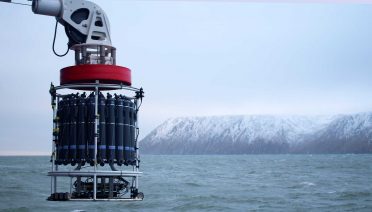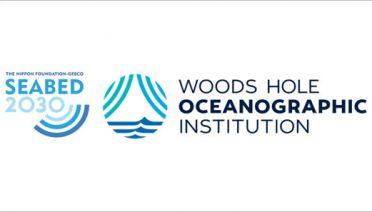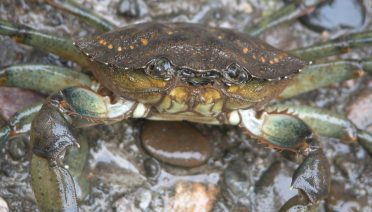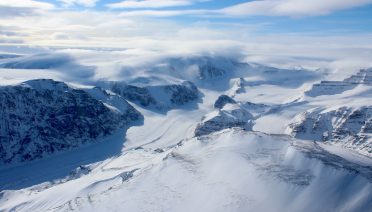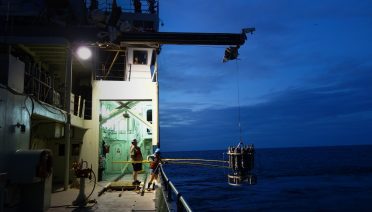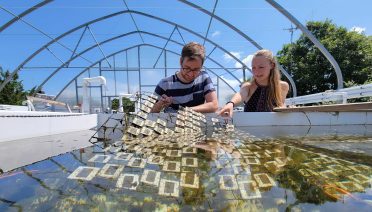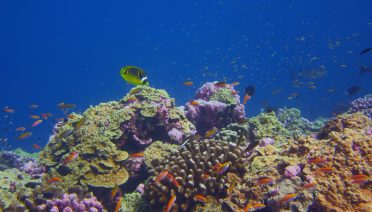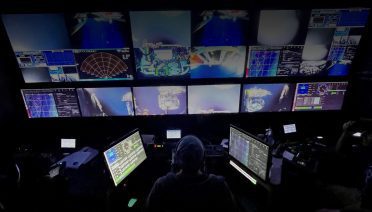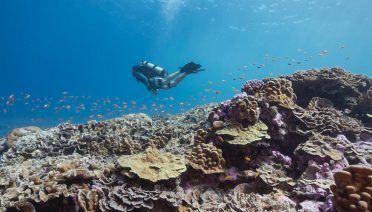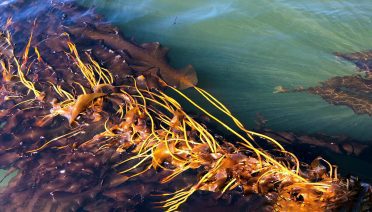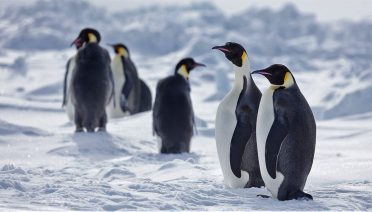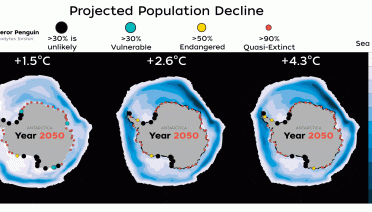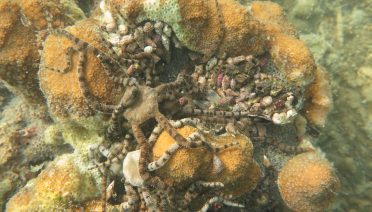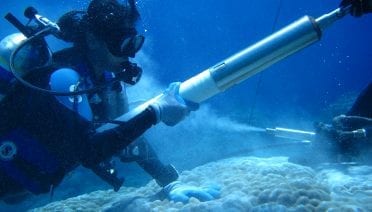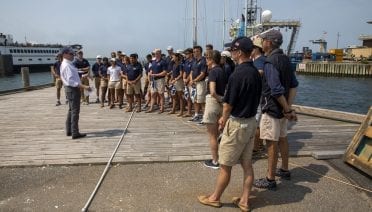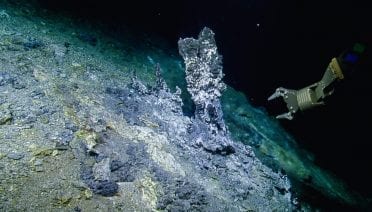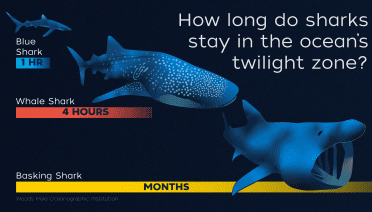Press Room
Changes in the northern Alaskan Arctic ocean environment have reached a point at which a previously rare phenomenon-widespread blooms of toxic algae-could become more commonplace, potentially threatening a wide range of marine wildlife and the people who rely on…
Woods Hole, Mass. – The Nippon Foundation-GEBCO Seabed 2030 Project and Woods Hole Oceanographic Institution (WHOI) have signed a Memorandum of Understanding in recognition of both organisations’ work to advance our understanding of ocean bathymetry. This will complement the goals…
Vertical Migration by artist group SUPERFLEX will be projected onto the facade of the United Nations’ 505-foot tower in New York, on 21-24 September 2021, coinciding with the 76th General Assembly and Climate Week NYC. The projection seeks to draw global attention to the critical role of the ocean in global climate, a primary focus of Woods Hole Oceanographic Institution’s Ocean Twilight Zone Project.
A new study led by Carolyn Tepolt, an associate scientist of biology at Woods Hole Oceanographic Institution, is investigating the adaptive mechanisms of the green crab along the west coast of North America, where it has shown extensive dispersal in the last decade despite minimal genetic diversity.
New collaborative research from the WHOI and five partner institutions published today in Nature Geoscience, reveals that during past periods glaciers and ice caps in coastal west Greenland experienced climate conditions much different than the interior of Greenland. Over the past 2,000 years, these ice caps endured periods of warming during which they grew larger rather than shrinking.
The new Center for Chemical Currencies of a Microbial Planet (C-CoMP) will focus on the chemical processes that underpin ocean ecosystems.
Sunlight was once thought to only fragment plastics in the marine environment into smaller particles that chemically resemble the original material and persist forever. However, scientists more recently have learned that sunlight also chemically transforms plastic into a suite of polymer-, dissolved-, and gas-phased products. Now, a new study finds that this chemical reaction can produce tens of thousands of water-soluble compounds, or formulas.
Some coral communities are becoming more heat tolerant as ocean temperatures rise, offering hope for corals in a changing climate. After a series of marine heatwaves hit the Phoenix Islands Protected Area (PIPA) in the central Pacific Ocean, a new study finds the impact of heat stress on the coral communities lessened over time.
On September 2, the remotely operated vehicle (ROV) Jason aided in the recovery of two underwater vehicles, ROV Hercules and Argus, that were stranded on the seafloor near British Columbia
A team led by Anne Cohen, a scientist at Woods Hole Oceanographic Institution, received $1.75M in funding from the National Science Foundation (NSF) to study how coral reefs survive extreme heat events caused by climate change. The multidisciplinary project taps into expertise across four WHOI departments to uncover the oceanographic and biological processes that enable corals to survive marine heatwaves.
An ongoing collaborative effort by Woods Hole Oceanographic Institution (WHOI), University of Massachusetts Dartmouth (UMassD), and Providence Public Library (PPL), has received a grant from FM Global. The project is investigating the role of historical weather data in current climate change research, and the increasingly urgent issues surrounding it.
A leader in ocean science, Woods Hole Oceanographic Institution (WHOI) is embarking on a study of how new seaweed strains could further enhance the burgeoning seaweed industry and offer solutions to some of the world’s pressing challenges. This research is funded in part by World Wildlife Fund (WWF) with support from the Bezos Earth Fund.
Today, the U.S. Fish and Wildlife Service (USFWS) announced a proposal to list the emperor penguin as a threatened species under the Endangered Species Act.
A new study published today in Global Change Biology provides valuable new data that highlights how species extinction risk is accelerating due to rapid climate change and an increase in extreme climate events, such as glacial calving and sea ice loss.
WHOI announced today the appointment of Dr. Natalie Nevárez as Chief Diversity, Equity and Inclusion Officer. Nevárez will begin in this newly created role on August 1, 2021.
A new study co-led by WHOI postdoctoral scholar Maggie Johnson looks closely at the changes occurring in both coral reef and microbial communities near Bocas del Toro during sudden hypoxic events, which occur when there is little to no oxygen in a given area of water.
The Indian Ocean has been warming much more than other ocean basins over the last 50-60 years. While temperature changes basin-wide can be unequivocally attributed to human-induced climate change, it is difficult to assess whether contemporary heat and freshwater changes…
Woods Hole, WHOI campus now a stop on the USNA summer sailing team’s route On Friday, July 15, five USNA sailing vessels carrying a total of 50 U.S. Navy personnel docked at Woods Hole Oceanographic Institution’s waterfront facilities, the first…
Researchers Emphasize the Need for Baseline Information of Microbial Food Webs The hydrothermal vent fluids from the Gorda Ridge spreading center in the northeast Pacific Ocean create a biological hub of activity in the deep sea. There, in the dark…
How large marine predators use the twilight zone to thrive, and survive Woods Hole, MA (July 11, 2021) — Sharks are some of the largest fish in the ocean, known as apex predators, that steal the show in films, television…

